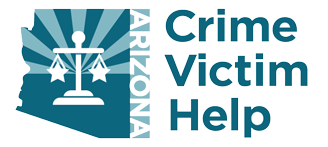Time Off From Work
Crime Victim Rights
If I am the victim of a crime, can I take time off work?
The Arizona Crime Victim Leave law allows Arizona crime victims to take unpaid time off work to attend certain court proceedings or to obtain a protective order.

The law only applies to workplaces that have 50 or more employees.
An employer cannot retaliate against an employee who takes unpaid time off under the Arizona Crime Victim Leave Law, but an employer does have the right to require the employee use their paid vacation, personal, or sick leave to cover their time.
What if my employer has less than 50 employees?
Employees who work for smaller employers that do not fall under the Arizona Crime Victim Leave law may want to talk to their supervisor or boss about the situation. The employer may have a written policy that requires the employer to allow an employee to take unpaid leave, or they may allow an employee to take unpaid leave even if they do not have to.

The Arizona Crime Victim Leave law does not apply to independent contractors (i.e. workers who are self-employed). Workers who receive an IRS-1099 are likely independent contractors.

What kind of court proceedings am I allowed to take time off work to attend?
The Arizona Crime Victim Leave Law applies to most civil and criminal hearings.
-
Any criminal proceeding where a victim has a right to be present
-
A hearing on release after conviction, which takes place after trial
-
The first appearance (arraignment) in a criminal case
-
Any hearing that addresses post arrest custody decisions (which determine whether the accused stays in jail)
-
Plea bargaining proceedings, such as a settlement conference or when the accused decides to plead guilty
-
A sentencing hearing
-
Any hearing related to a failure to comply with the victim’s rights
-
Any hearing involving a change to the perpetrator’s probation
The same rights apply to cases in the juvenile criminal process. A criminal case against a juvenile is referred to as a delinquency adjudication.
What kind of input does a crime victim have on when court proceedings will take place?
The prosecutor assigned to the case should approach victims of crimes committed by a juvenile or an adult.
The prosecutor is supposed to provide the victim with information about the hearings and inform the court of the victims’ schedule. The court will try to accommodate the victim’s schedule if possible.

Sick Leave
What is Sick Leave?
Arizona law (Title 23, Chapter 2, Article 8.1) gives all employees paid sick leave that may be used for many reasons.
If an employer has 15 or fewer workers, each worker earns one hour of sick leave for every 30 hours worked. Workers may not use more than 24 hours of sick leave in a year unless the employer raises that limit.
If an employer has 15 or more workers, each worker earns one hour of sick leave for every 30 hours worked. Workers may not use more than 40 hours of sick leave in a year unless the employer raises the limit.

An employer can make a written policy that requires workers to have been employed for 90 days before they can use sick leave.
To learn what a specific employer’s sick leave rules are, review your employee handbook or personnel manual or speak with your supervisor or manager.
For more information about paid sick leave: paid sick leave FAQ
When can I use sick leave?
Under Arizona law (A.R.S. § 23-373), workers may take sick leave from work:
When suffering from a mental or physical illness, injury, or health condition
When seeking a diagnosis or treatment for a mental or physical illness, injury, or health condition
When seeking preventive medical care, including dental care
When helping a family member with the diagnosis or treatment of a mental or physical illness, injury, or health condition, or helping a family member seek preventive medical care
When the worker or a member of their family is directly affected by a public health emergency, or
When the worker or a member of their family is a victim of a crime of domestic violence, sexual violence, abuse, or stalking, the worker can use sick leave for medical attention, counseling, other victim services, legal assistance, relocation, or taking steps to secure their home.
When seeking a diagnosis or treatment for a mental or physical illness, injury, or health condition
When seeking preventive medical care, including dental care
When helping a family member with the diagnosis or treatment of a mental or physical illness, injury, or health condition, or helping a family member seek preventive medical care
When the worker or a member of their family is directly affected by a public health emergency, or
When the worker or a member of their family is a victim of a crime of domestic violence, sexual violence, abuse, or stalking, the worker can use sick leave for medical attention, counseling, other victim services, legal assistance, relocation, or taking steps to secure their home.

Can my employer ask why I am taking sick leave?
No. An employer cannot ask for details about a worker’s request to use sick leave. If a worker does provide details, the employer must keep them confidential. They can tell other workers that someone is taking leave, but not why.
Ordinarily, an employer cannot require a worker to provide documentation of why the worker is requesting sick leave. However, an employer can require a worker to provide documentation if the worker uses three or more consecutive days of sick leave. If a worker uses three or more consecutive days of sick leave, the employer can require a document signed by a health care professional confirming the worker’s need to use sick leave.
If the worker needs to use sick leave because they or a member of their family are a victim of domestic violence, sexual violence, abuse, or stalking, the worker can provide the employer with any one of the following kinds of documentation:
If the worker needs to use sick leave because they or a member of their family are a victim of domestic violence, sexual violence, abuse, or stalking, the worker can provide the employer with any one of the following kinds of documentation:
- A police report
- A protective order or other evidence from the court or the prosecutor
- A signed statement from a domestic violence or sexual violence program or victim services organization
- A signed statement from a witness advocate
- A signed statement from an attorney, a member of the clergy, or a medical or other professional
- A signed statement from the worker
What are some of the other rules about sick leave?
An employer cannot require a worker to find someone else to cover their shift.
An employer can require workers to make a good faith effort to provide advance notice of sick leave if possible. This can be done in any form of communication.
A worker can take sick leave one hour at a time, or in smaller increments if the employer’s written policy allows it.
An employer can require workers to make a good faith effort to provide advance notice of sick leave if possible. This can be done in any form of communication.
A worker can take sick leave one hour at a time, or in smaller increments if the employer’s written policy allows it.
If an employer violates any of the rules about sick leave in Arizona, you can file a complaint with the Arizona Industrial Commission. The Earned Paid Sick Time Claim Form is available here:
Family and Medical Leave Act
What is the Family and Medical Leave Act?
The Family and Medical Leave Act, commonly known as the FMLA, is a federal law that allows workers to take up to 12 weeks of unpaid leave per year for certain family and medical reasons while keeping their job, position, and group health insurance coverage at work.
A worker can use leave under the FMLA if:

Their employer has over 50 employees within a 75-mile radius, and

The worker has worked at least 1,250 hours over the past 12 months
Learn more about the FMLA here.
Can I take FLMA if I am a victim of a crime?
FMLA leave can be used for any situation that fits the definition of a serious health condition.
Serious health conditions include physical injuries and physical and mental illness, including mental health conditions such as PTSD (Post Traumatic Stress Disorder), depression, and anxiety.

Victims of a crime with serious health conditions may be able to work with their employer to use accrued paid leave if they cannot afford to take that much unpaid leave.
How do I request FMLA leave?
If an employer is required to provide FMLA leave to its qualified employees, the employer should have a process in place for workers to make requests.

A worker who needs to take FMLA leave should make the request as early as possible.
An employee must tell the employer at least 30 days in advance that the employee plans to take FMLA leave.
If the employee cannot tell the employer 30 days in advance, the employee must tell the employer as soon as possible and practical. The employer cannot deny FMLA leave if it is needed on short notice. However, the employer can deny FMLA leave if the employee could have told the employer much earlier.
If the employee cannot tell the employer 30 days in advance, the employee must tell the employer as soon as possible and practical. The employer cannot deny FMLA leave if it is needed on short notice. However, the employer can deny FMLA leave if the employee could have told the employer much earlier.

The employer should provide the worker with all the required paperwork.
The employer may require the worker to work with a doctor to complete the required paperwork. This will help the employer determine if the worker’s issue is a qualifying serious health condition, how much time off the worker needs, and when the worker is expected to return to work.
The doctor can charge for completing this paperwork, and the worker will be responsible for paying any fee that is not covered by insurance.
The doctor can charge for completing this paperwork, and the worker will be responsible for paying any fee that is not covered by insurance.
It is not always known when a worker is going to be healthy and well enough to return to work. A worker who recovers early should tell the employer as soon as possible and notify the employer at least 48 hours in advance of when they plan to return to work. If the worker needs to take more FMLA leave than initially predicted, communicating with the employer may make the process easier.
What can I do if my employer violates the FMLA?
If an employer violates the FMLA, you can file a complaint with the U.S. Department of Labor.

